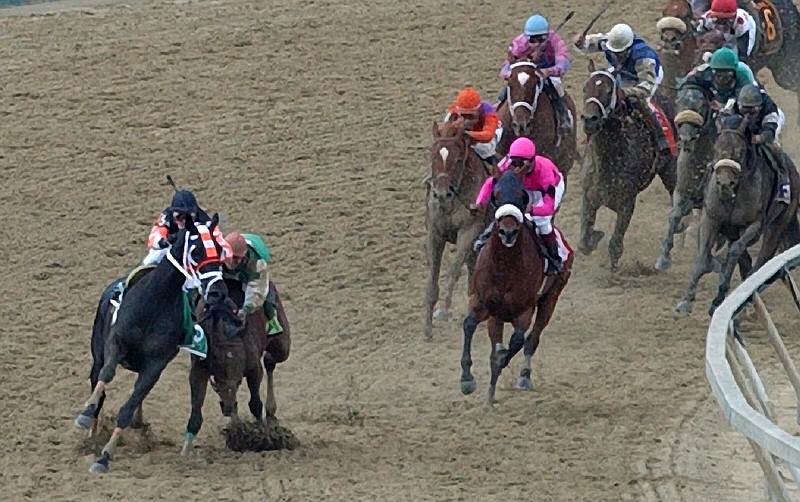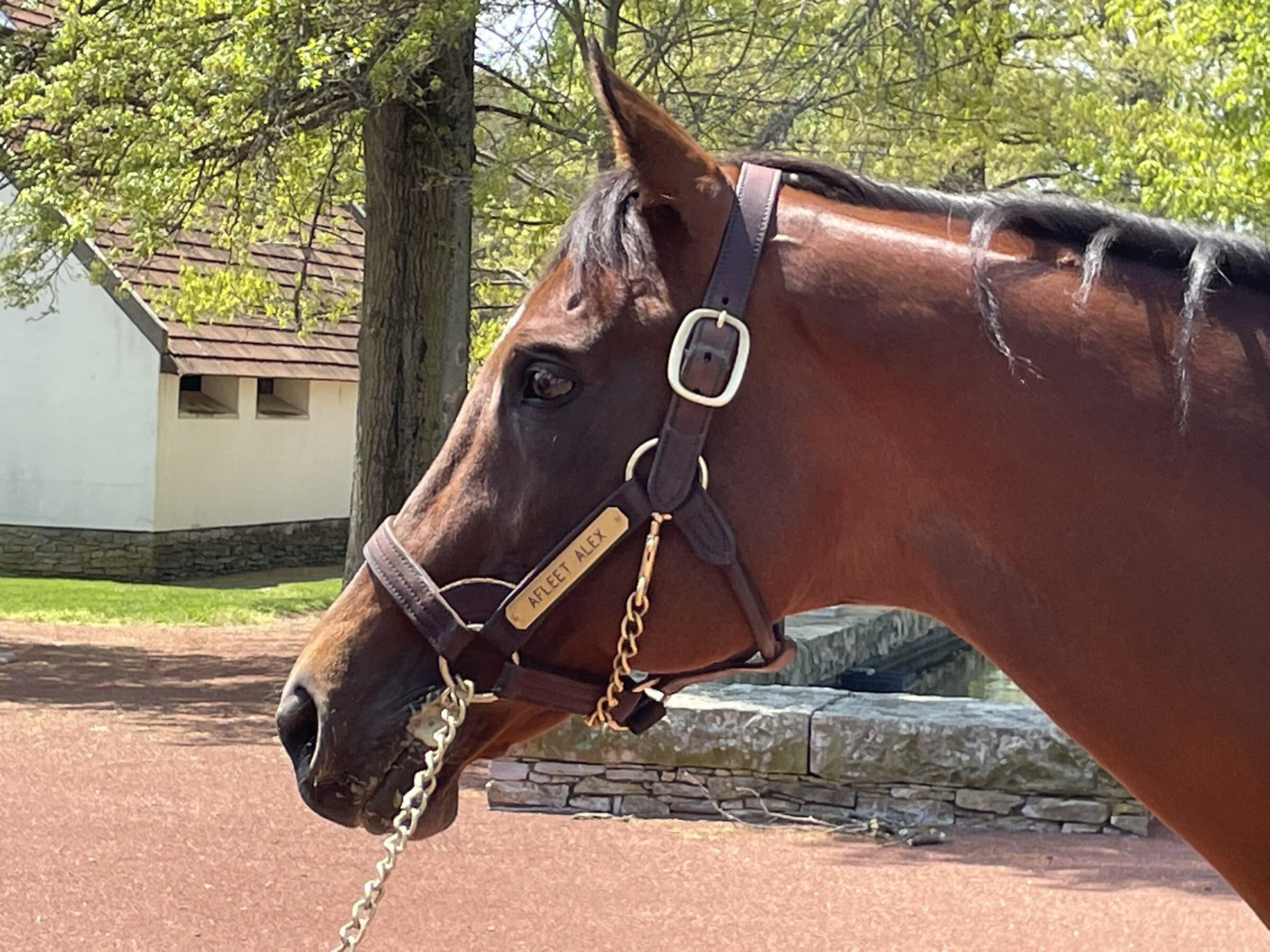The 148th running of the Preakness Stakes on Saturday will create its own memories, but it's very unlikely it or any other Triple Crown race will ever top Arkansas Derby winner Afleet Alex's speculator display of athleticism in the 2005 Preakness.
Prior to the Preakness, Afleet Alex dominated the Arkansas Derby at Oaklawn Park in Hot Springs by running away for an eight-length victory which was an Arkansas Derby record at the time. It still ranks third behind Curlin's 10 1/2 lengths in 2007 and Bodemeister's 9 1/2 lengths in 2012.
He went off as the bettor's second choice at the Kentucky Derby. But despite finishing a length back in third, Afleet Alex was the betting favorite among the 14-horse field for the Preakness at 3-1.
Afleet Alex, who's one of seven Arkansas Derby winners to win the Preakness Stakes, put on performance that many consider the most amazing race in Triple Crown history.
Jockey Jeremy Rose and Afleet Alex had the perfect trip going by riding the rail from the start. Nearing the stretch, Rose had settled behind Greeley's Galaxy. When the longshot moved from the rail, Rose urged Afleet Alex, who stormed past the third-running Greeley's Galaxy with only Scrappy T and High Limit ahead.
"When he moved out of the way, it was like they just gave me the race," Rose said.
But Rose's supreme confidence of victory was about to be severely tested.
He and Afleet Alex flew by High Limit and looked ready to pass on the outside of Scrappy T at the start of the stretch when jockey Ramon Dominguez wound up his left hand to whip Scrappy T.
Rose, who was 26 at the time, said he sensed something bad was about to happen.
"I'm not sure I knew what was coming or what," Rose said. "When he switched over and wound up, I said, 'Oh s***,' and he hit him, and he [Scrappy T] just ducked down from underneath him."
Scrappy T veered outside, forcing the two horses to clip heels. The collision caused Afleet Alex to stumble to his knees in what looked to be a disaster in the making and had Rose in survival mode.
"At that point, it was stay close to Alex and he'll protect me from what he can when we hit the ground, because that was going to be the only protection I was going to have because the whole field was on our ass," Rose said. "It was going to be bad. It was going to be detrimental for racing at that point."
A split second after Afleet Alex went to his knees with Rose clinging to his neck, Afleet Alex miraculously recovered and went on to pull away from Scrappy T and win by 4 3/4 lengths before a stunned and then record crowd of 115,318.
"A lot of people give me credit. 'Oh, he picked him up,' " Rose said. "I didn't pick s*** up. If he didn't come up underneath me, we were going down. I didn't really have the reins at that point."
Hot Springs native and NBC racing analyst Randy Moss estimates Afleet Alex was traveling about 35 mph when he and Rose nearly went tumbling to the ground.
"That ride and that display of athleticism, not just the horse, but the rider too, is going to go down in history," said Moss, a former handicapper for the Arkansas Gazette and Arkansas Democrat.
Rose admitted his riding style of having his feet in the irons versus the tips of the feet like most jockeys likely helped him stay on board Afleet Alex.
"In that particular situation, it might of made the difference between Jeremy getting thrown to the track and winning the Preakness," Moss said.
Afleet Alex's trainer Tim Ritchey, who bought the horse for $75,000 for the Cash is King ownership group, has watched replays of the race and said he still marvels at how his horse stayed up.
"It just amazes me how quick the horse's reaction had to be going that speed to flip those legs out and save himself," Ritchey said. "I watch in super slow motion and Jeremy is coming off [the neck] going forward and there's nothing to keep him in the saddle and when Alex comes up, he actually lifts his head and neck and pushes Jeremy back into the saddle which was phenomenal and Jeremy regained himself.
"Give him all the credit in the world: He knew his horse was OK within a stride or two and picked him up and asked him [to run] and Alex just responded, which horses in that situation very, very rarely do that."
Rose, who won an Eclipse Award in 2001 as the nation's top apprentice, has a picture on his wall the moment Afleet Alex went to his knees.
"His back legs are spread out, his left leg is up underneath his belly and his right leg is stuck out in front of his head," Rose said. "That's how athletic he was."
The accolades for the way Afleet Alex won the Preakness is a long impressive list.
A 2020 USA Today story rated Afleet Alex's victory in the Preakness as the No. 2 best Triple Crown race of all time behind Victory Gallop's victory in the 1998 Belmont Stakes and one ahead of Secretariat's dominating victory in the 1973 Belmont to win the Triple Crown.
The Bleacher Report rated Afleet Alex as one of the 10 most memorable horses in Preakness history in 2014 with a ranking of No. 2, only behind Secretariat.
Afleet Alex's victory was voted National Thoroughbred Racing Association's "Moment of the Year" for 2005.
In 2022, horesyhooves.com listed the 10 most legendary horse races in history and ranked the Afleet Alex's victory No. 7.
Ritchey said he began watching Triple Crown races at age 4 and recalls greats like Northern Dancer and Tim Tam. But he said he can't remember seeing anything like Afleet Alex's near-fall and recovery.
"All those old horses and I've never saw anything like what happened to him, and get up from basically his knee and keep his momentum ... stay on his feet and the rider stay on, then again accelerate because he lost all of his momentum he had and go on to win," Ritchey said. "It gives you chills, is what it does.
"You don't see instances like that with any athlete where they actually regain their balance at that point of the race and they lose all the momentum, and picked themselves up and accelerate and go on to win."
Some have compared Afleet Alex's near fall in the Preakness to Alysheba clipping heels with another horse that forced him to having a very slight stumble nearing the finish line of the 1987 Kentucky Derby.
Moss said the two incidents don't compare.
"If you watch the stretch run and you're not looking for it, some people would even miss it [Alysheba]. But there's no missing what happened to Afleet Alex in the Preakness," Moss said. "That was truly remarkable."
Afleet Alex's winning time of 1:55.04 was the fastest time since 1998 despite the near fall likely costing at least a second of time.
Next up was the Belmont Stakes where Rose and Afleet Alex blew past Giacomo at the beginning of the final turn with track announcer Tom Durkin belting out, "He passed Giacomo like he was standing still!" on the way to a seven-length victory.
Afleet Alex covered the final quarter-mile in :24.50 seconds, the fastest final quarter since Arts and Letters in 1969 and even faster than Secretariat.
"I always had the confidence there was absolutely no horse in front of me I couldn't pass when I wanted to," Rose said.
Rose said he blames himself for Afleet Alex not winning the Kentucky Derby and the Triple Crown.
"I used him too many times. He was a one-run horse," Rose said of his Derby ride. "Every time a hole opened up, I went in it and I shouldn't have done that. ... I should've set back and rode the race he likes to run."
Afleet Alex didn't race again after the Belmont when an ankle injury was discovered. He retired to Gainesway Farm in Lexington, Ky., with 8 wins, 2 seconds and a third in 12 starts and career earnings of $2,765,800.
His only time not finishing in the money was in the Rebel Stakes at Oaklawn when he finished sixth in a six-horse field. After the race, it was discovered he had a lung infection.
Some critics believed Ritchey's training methods were too hard.
"Tim Ritchey made all the right calls," Moss said. "Every trainer has their own methods and obviously what Tim Ritchey did with Afleet Alex was the right thing."
The Rebel Stakes was the only race Rose wasn't aboard Afleet Alex.
"He should've been undefeated except for maybe the Rebel, but other than that he should've never been beat," said Rose, who forged a close relationship with Afleet Alex. "I tell people if I had Alex now, he would've never got beat."
The son of Northern Afleet, Afleet Alex was the landslide winner of the 2005 Eclipse Award for the nation's best 3-year-old male.
"Afleet Alex came along in a year in which the 3-year-old crop was not especially strong, but he was heads and shoulders above the other 3-year-olds in his class," Moss said. "If you could go back and rewind and rerun that Triple Crown again from the start, I think more times than not Afleet Alex sweeps the Triple Crown."
Even Afleet Alex appears to remember his greatness. While taking fans on tours to see Afleet Alex at Gainesway Farm, Jorge Vasquez has replayed the Preakness victory a couple of times on his phone in front of Afleet Alex's stall.
Both times, he said, there was a reaction.
"You can see him perk up," Vasquez said. "I like to think he's reliving those days. It's a moment he probably does remember, just like we do."

